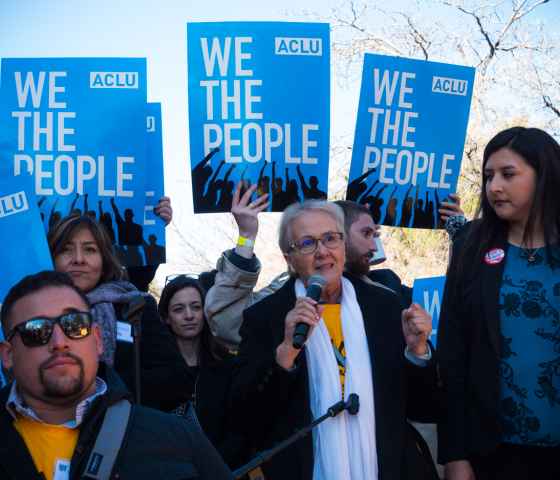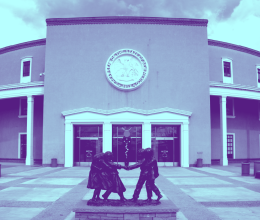One of the axiomatic truths of the legislative session is that it’s really hard to pass a good law. Believe us, we know. The ACLU of New Mexico has worked tirelessly year after year to advance legislation that makes our state a more just, free, and safe place to live and raise families, but year after year we see most of our priority bills fall victim to a torturous legislative process filled with a myriad of pitfalls, minefields, and political quagmire.
It was especially tough during the past eight years of the Martinez administration. Throughout her tenure as governor, Susana Martinez’s legislative agenda included doubling down on mass incarceration, vetoing digital privacy bills, implementing voter suppression schemes, working to restrict abortion access, and demonizing immigrant communities.
“The previous administration was a disaster for civil liberties in New Mexico,” recalls Steven Robert Allen, the ACLU of New Mexico’s Director of Public Policy. “We were forced to spend most of our time and energy desperately fighting back bad bills. Aside from notable exceptions like signing a ban on civil asset forfeiture in 2015, Governor Martinez vetoed every single piece of civil liberties legislation we managed to pass.”
"By the end of the 2019 legislative session, the ACLU of New Mexico had eight bills in its three strategic priority areas passed by the legislature and signed by the governor..."
But last year, all that changed. The 2018 elections brought a new governor into the Roundhouse and fresh blood into the legislature, creating for the first time in over a decade a discernible path for progressive legislation to become law. It was a once in a generation opportunity to break the log jam and advance the cause of freedom and fairness in New Mexico. We weren’t about to let the opportunity pass us by.
As an organization, we identified three key strategic areas of work: reproductive freedom, immigrants’ rights, and criminal justice reform as our top priorities for proactive work in New Mexico. With an eye towards advancing legislation in each of these key areas, the ACLU of New Mexico began expanding its capacity by hiring organizers, policy experts, and communications staff, coordinating strategies in coalition with allied organizations, and building power in communities directly affected by these issue areas.
These investments paid off in a big way. By the end of the 2019 legislative session, the ACLU of New Mexico had eight bills in its three strategic priority areas passed by the legislature and signed by the governor - more than any legislative session in the ACLU of New Mexico’s nearly 60 year history.
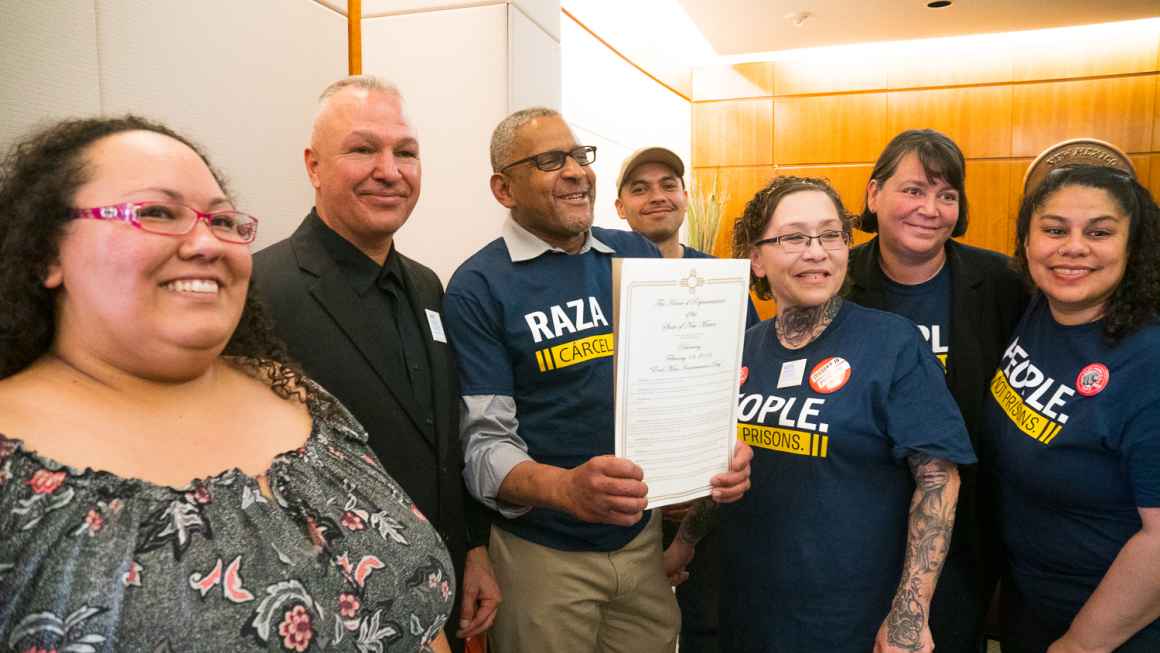
A Wave of Reform for New Mexico's Criminal Legal System
The most overwhelming area of success was in the area of criminal law reform, accounting for more than half of the bills the ACLU of New Mexico helped pass this session. Over the past three decades, New Mexico’s prison population has grown a staggering 481 percent as lawmakers imposed increasingly harsh sentences as part of the War on Drugs. Rather than increasing public safety, these so-called “tough on crime” sentencing laws have torn thousands of families apart and disproportionately affected women and people of color.
“Our state has been held back for a generation because of this outdated and ineffective approach to public safety,” said Barron Jones, Smart Justice Coordinator for the ACLU of New Mexico. “We set ambitious goals this legislative session to reform our criminal justice system, prioritize people over prisons, and implement real public safety solutions that tackle the underlying causes of crime, not just the symptoms.”
Part of the key theory of change on this issue has been centering people who have been personally impacted by the criminal legal system, including formerly incarcerated people, family members, and survivors of crime. The ACLU of New Mexico formed a Smart Justice Advisory Board led by community members to drive the work, and invested countless hours organizing and training activists. These efforts culminated in a lobby day at the legislature where dozens of Smart Justice volunteers made personal appeals to legislators on why New Mexico needs criminal law reform.
“We set ambitious goals this legislative session to reform our criminal justice system, prioritize people over prisons, and implement real public safety solutions that tackle the underlying causes of crime, not just the symptoms.”
“The biggest victory in my eyes was the way we were able to get the community to show up and help fight for legislation,” said Jones. “It was major to see folks really engaged in the process and eager to speak truth to power. Many folks weren’t aware that they could be involved in the process.”
The personal experiences that the Smart Justice volunteers were able to share with legislators and influencers helped humanize criminal justice issues and change the conversation around reform. Formerly incarcerated people could speak personally about how criminal record expungement and banning questions about prior arrests and convictions on initial employment would help them move on with their lives and successfully reintegrate into society. Crime survivors could speak powerfully about their desire for a justice system that prioritizes treatment and rehabilitation over incarceration. When we advocated for reforming the brutal practice of solitary confinement in New Mexico correctional facilities, Justice Advisory Board Member Kelly Garcia was able to speak from personal experience about what it is like to spend years on end locked in isolation in a cell the size of a parking lot.
“To this day I’m still tormented,” remembered Garcia as she struggled through tears to share her story before a bank of TV cameras at a press conference during the session. “There are times that I just wanted to jump out of my skin and run. If I’ve got to tell my story a thousand times to help just one person, then I’m going to do it, because solitary confinement is real.”
Because of brave advocacy from Garcia and others, solitary confinement reform passed this session, along with bills that expunge criminal records, reduce employment discrimination against the formerly incarcerated, decriminalize marijuana possession, and a myriad of other reforms.
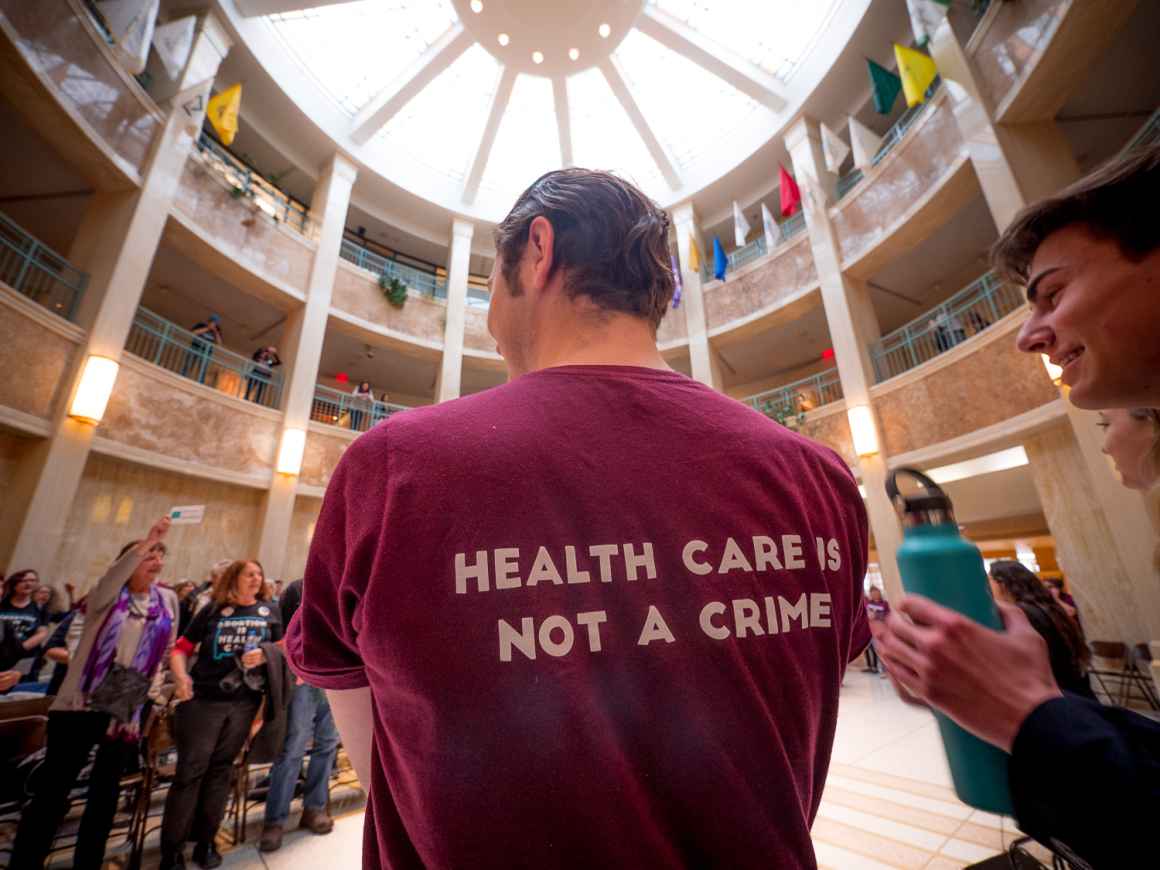
Expanding Access to Reproductive Healthcare
As Trump continues to pack the U.S. Supreme Court with anti-abortion justices, reproductive rights nationwide are threatened in a way not seen for a generation. New Mexico is fortunate in that we have been able to fend off many of the restrictions placed on abortion in other states, but the future of reproductive healthcare access nationwide is very much in peril. Looking into this uncertain future, we worked with allies in the reproductive health and justice communities to put forward a legislative agenda to make New Mexico a place that continues to respect women’s reproductive decisions no matter what.
The expanded supply greatly reduces barriers New Mexicans face accessing contraceptive care, especially for people living in rural parts of the state where the nearest pharmacy may be many miles away.
This legislative session we scored a significant victory when Governor Lujan Grisham signed a bill we helped craft that greatly expands contraception access for New Mexicans. Not only does the new law require insurance companies to cover, without out of pocket costs, an expanded range of contraception for both men and women, as well as cover over the counter methods without a prescription. It allows for the dispensing of up to a six month supply of contraception at once. The expanded supply greatly reduces barriers New Mexicans face accessing contraceptive care, especially for people living in rural parts of the state where the nearest pharmacy may be many miles away.
Unfortunately, we weren’t able to get our second priority bill across the finish line. HB 51, a bill that would have removed a dangerous and outdated pre-Roe v. Wade law from the 1960s that criminalizes abortion care in New Mexico, was voted down on the Senate floor after passing the House and Senate committees. By removing the criminal abortion statute from our law books, we would ensure that no one is criminalized for seeking health care in New Mexico and secure uninterrupted access to abortion care if the U.S. Supreme Court to reverses Roe v. Wade.
It was a big disappointment to see HB 51 fail on the Senate floor, but the fight is far from over,” said ACLU of New Mexico Reproductive Rights Attorney Ellie Rushforth. “The simple truth is that abortion is healthcare, and healthcare isn’t a crime. The governor has been outspoken in her support for protecting access to reproductive healthcare, as have many legislators. We’re confident that we’ll have another opportunity to remove this offensive and harmful language from our laws.”
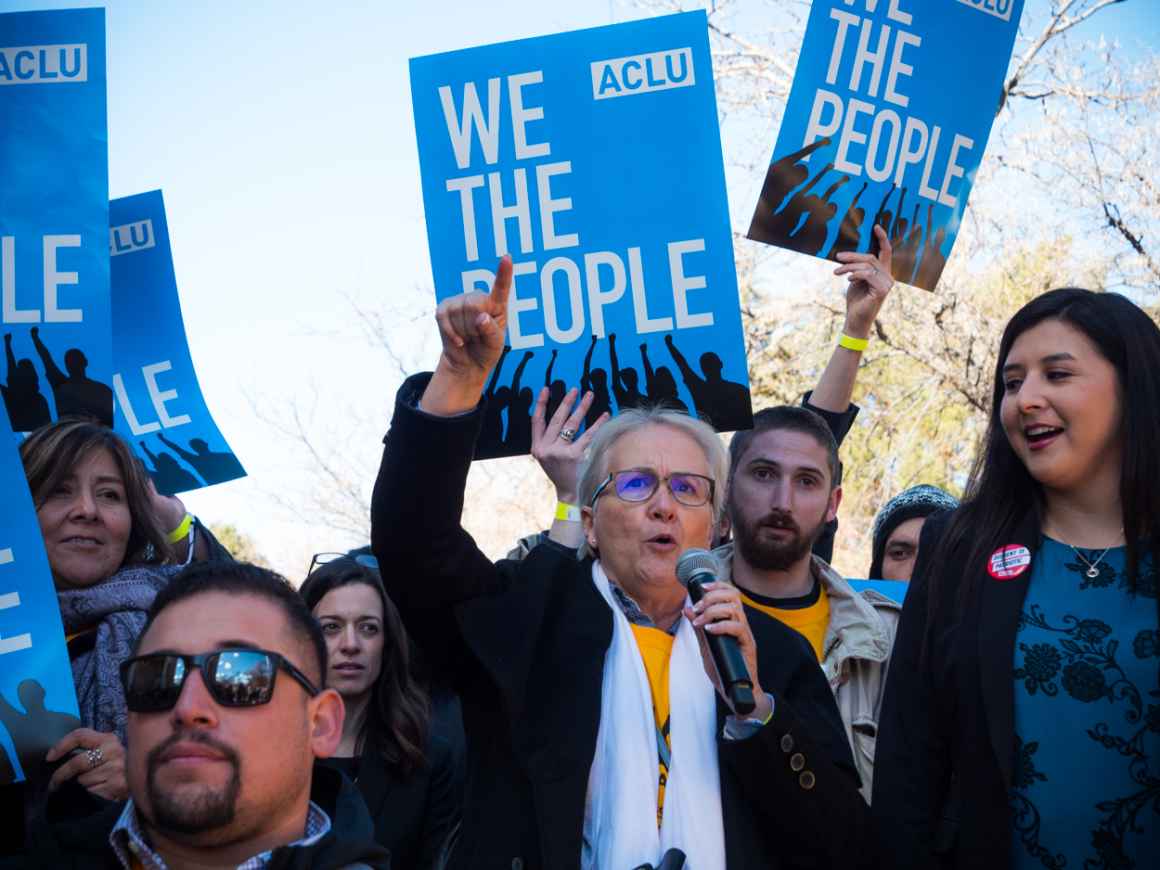
Fighting for the Dignity and Safety of Immigrant Communities
One of our top priorities heading into legislative session was to promote laws that would make New Mexico a place where immigrants could live in safety and dignity. Immigrants have been an integral part of New Mexico’s story for hundreds of years and immigrant families continue to be valued members of our communities today. Unfortunately, Trump’s administration has been ramping up its racist and xenophobic rhetoric while implementing anti-immigrant policies designed to tear apart families and deport as many people as possible.
To fight back against Trump’s deportation machine, the ACLU of New Mexico joined a coalition of immigrant rights organizations to advocate for SB 196, a bill that would prohibit any state law enforcement resources from being used to enforce federal immigration laws, as well as limit jails’ authority to hold federal immigration detainees. Several cities and counties in New Mexico have already implemented similar policies to ensure that immigrants who are victims or witnesses to crimes do not fear calling the police when they need help.
“It was really incredible to see how community members, regardless of whether they were personally impacted or not, came together in support of immigrant families.”
To mobilize support for SB 196, the ACLU of New Mexico joined a massive organizing effort to reach immigrant communities in every corner of the state. Staff from the Albuquerque office worked with the ACLU of New Mexico Regional Center for Border Rights in Las Cruces to hold a series of trainings to equip hundreds of local activists with tools to help them lobby their legislators in support of immigrant rights bills, as well as bills in our other priority issue areas. In late January, the freshly trained army of activists joined hundreds of other community members at the state capitol for the Immigrant Day of Action, one of the largest lobby days to ever occur at the Roundhouse.
“We had over 800 people from all over New Mexico at the rally itself,” said Stephanie Corte, the ACLU of New Mexico Immigrants’ Rights Campaign Strategist. “It was really incredible to see how community members, regardless of whether they were personally impacted or not, came together in support of immigrant families.”
Unfortunately, despite the strong show of community support, the legislature failed to prioritize SB 196 and it died in committee. Though disappointing, it won’t be the end. Our efforts helped send an unmistakable message that New Mexico values and welcomes immigrants, and built critical momentum that will help move us closer to passing a “no resources” bill in subsequent sessions.
We did however, manage to pass our other priority immigrants’ rights bill, SB 278, which fixes New Mexico’s driver’s license law by removing stigma from the current two tiered system and eliminating the fingerprinting requirement that deterred undocumented people from applying for a license.
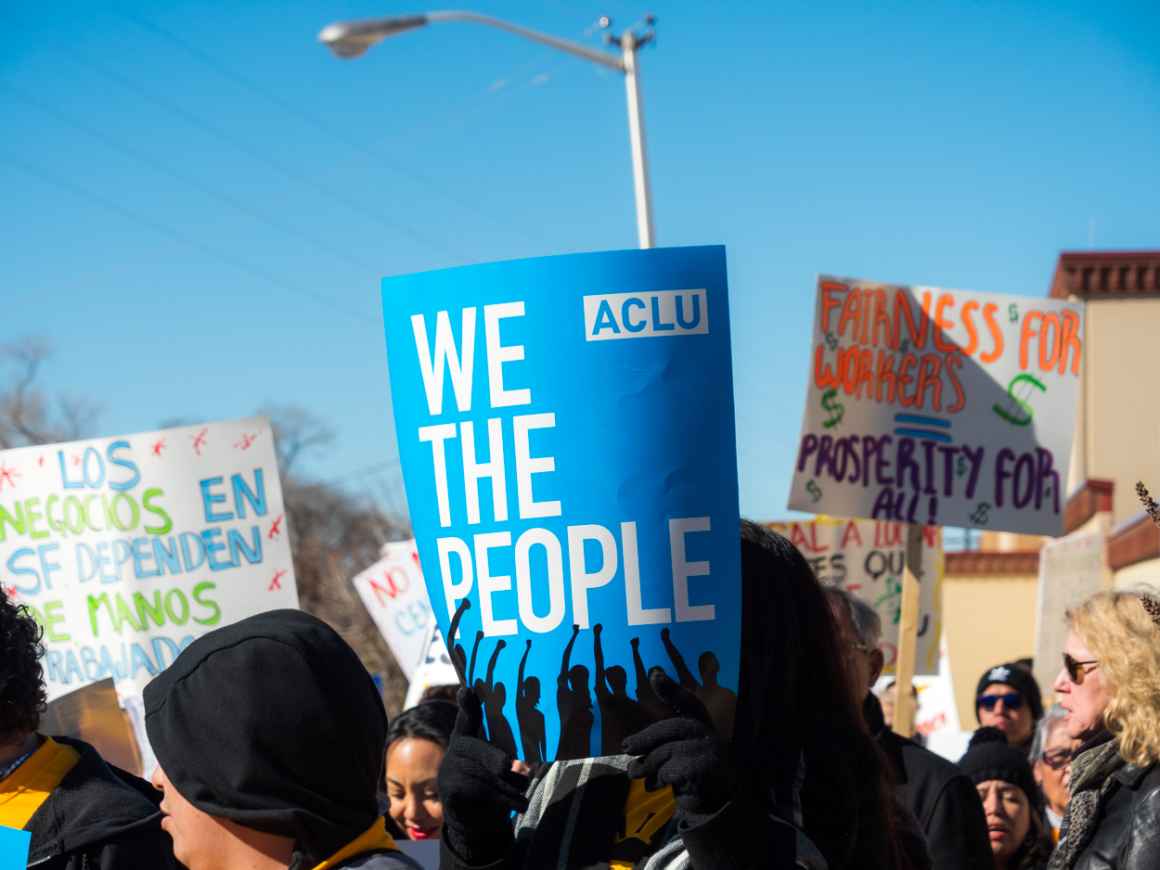
A Giant Leap Forward
All together, these legislative achievements constitute a giant leap forward for civil liberties in New Mexico. Moreover, these victories stand as a testament to the power and spirit of the New Mexican people. Our state has never been the largest or the richest, and we’ve always struggled with our share of problems. But the hundreds of ACLU volunteers who came out this session to help fight for more fair and just policies demonstrated that we have an abiding love for our communities and a dedication to improving the lives of all New Mexicans.
As our politics at the national level become increasingly ugly, hateful, and violent, New Mexico made bold strides in the opposite direction. In the policies and laws that bind us together as a society, we chose compassion over hate. We chose to give second chances to people swept up by the criminal legal system. We expanded critical healthcare for all New Mexicans. We extended a hand of welcome to immigrant families. Together, we moved New Mexico, and by extension all of America, a little bit closer to the ideals of freedom and fairness wherein our nation’s true greatness lies.
